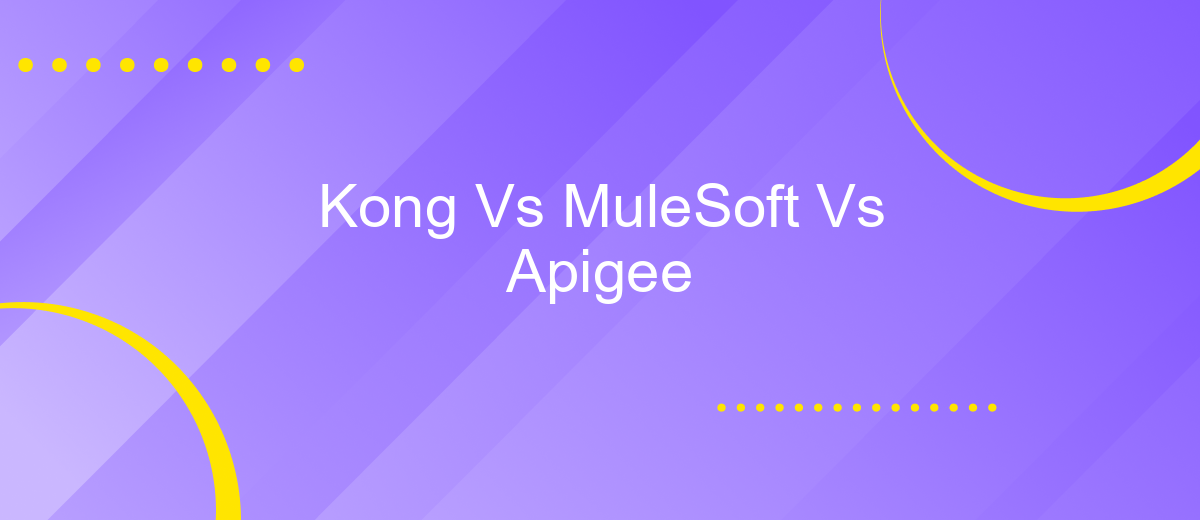Kong Vs MuleSoft Vs Apigee
In the rapidly evolving landscape of API management, choosing the right platform is crucial for seamless integration and performance. This article delves into a comparative analysis of three leading API management solutions: Kong, MuleSoft, and Apigee. By examining their features, strengths, and weaknesses, we aim to provide insights to help organizations make informed decisions tailored to their specific needs.
Introduction: Kong, MuleSoft, and Apigee Overview
In the rapidly evolving landscape of API management, Kong, MuleSoft, and Apigee stand out as leading solutions, each offering unique features and capabilities to streamline API integration and management.
- Kong: Known for its high performance and scalability, Kong is an open-source API gateway that provides a range of plugins and features for traffic control, security, and analytics.
- MuleSoft: MuleSoft's Anypoint Platform is a comprehensive integration solution that facilitates API design, management, and deployment, making it a popular choice for enterprises looking for robust integration capabilities.
- Apigee: Acquired by Google, Apigee offers a powerful API management platform that focuses on security, analytics, and developer engagement, making it ideal for large-scale API ecosystems.
Each of these platforms brings distinct advantages to the table, catering to different organizational needs. For businesses seeking to automate and simplify their integration processes, services like ApiX-Drive can complement these platforms by providing seamless data transfer and integration capabilities across various applications and systems.
Key Features and Capabilities Comparison

Kong, MuleSoft, and Apigee each offer unique features and capabilities that cater to different API management needs. Kong stands out with its lightweight, high-performance API gateway that supports microservices and offers extensive plugin architecture for customization. It provides robust security features, including OAuth2 and JWT, and excels in scalability, making it ideal for dynamic environments. MuleSoft, on the other hand, is renowned for its comprehensive Anypoint Platform, which integrates APIs, data, and devices seamlessly. It offers a rich set of tools for designing, building, and managing APIs, along with strong analytics and monitoring capabilities.
Apigee, a Google Cloud product, is known for its powerful API analytics, developer portal, and monetization features. It provides extensive security protocols and is particularly strong in handling large-scale enterprise API management. For users looking to automate and streamline their API integrations, services like ApiX-Drive can be invaluable. ApiX-Drive simplifies the process of connecting different applications and automating workflows, enhancing the overall efficiency of API management. Each of these platforms brings unique strengths to the table, making the choice dependent on specific organizational needs and goals.
Pricing and Licensing Models Analysis

When comparing Kong, MuleSoft, and Apigee, it's essential to examine their pricing and licensing models to determine which best suits your organization's needs. Each platform offers distinct pricing structures that cater to different user requirements and budgets.
- Kong: Kong provides a flexible pricing model with a free open-source version, an enterprise edition with advanced features, and a pay-as-you-go option. This allows businesses to scale their usage based on demand and only pay for what they need.
- MuleSoft: MuleSoft operates on a subscription-based pricing model, which includes various tiers depending on the number of integrations and API calls. It also offers a 30-day free trial for users to explore its capabilities before committing to a plan.
- Apigee: Apigee, part of Google Cloud, offers a tiered pricing model with a free trial, standard, and enterprise options. The pricing is based on the number of API calls, with additional costs for premium features and support.
Each platform's pricing model reflects its target audience and intended use cases. For businesses seeking a cost-effective solution with robust integration capabilities, services like ApiX-Drive can complement these platforms by providing seamless integration options and automation tools.
Deployment and Scalability Considerations

When evaluating Kong, MuleSoft, and Apigee for deployment and scalability, it's crucial to consider how each platform handles these aspects. Kong is known for its lightweight, modular architecture, making it a good choice for dynamic scaling in cloud-native environments. MuleSoft, with its Anypoint Platform, offers robust deployment options across on-premises, cloud, and hybrid environments, ensuring flexibility and scalability. Apigee, now a part of Google Cloud, leverages Google's powerful infrastructure for seamless scaling and high availability.
Each platform has its own set of tools and features to facilitate deployment and scalability. Kong provides easy integration with Kubernetes and Docker, allowing for smooth container orchestration. MuleSoft offers comprehensive CI/CD capabilities, enabling automated deployments and scaling. Apigee benefits from Google's global network, ensuring low latency and high performance.
- Kong: Lightweight, modular, integrates well with Kubernetes and Docker.
- MuleSoft: Supports on-premises, cloud, and hybrid deployments, strong CI/CD capabilities.
- Apigee: Utilizes Google Cloud infrastructure, ensures high availability and performance.
In addition to these platforms, services like ApiX-Drive can further streamline integration processes, offering automated workflows and seamless data synchronization. This can be particularly beneficial for organizations looking to enhance their API management strategies without extensive manual intervention.
Advantages and Disadvantages of Each Gateway
Kong is a highly flexible and scalable API gateway that excels in performance and extensibility. Its open-source nature allows for extensive customization, making it ideal for businesses with specific needs. However, the complexity of configuration and management can be a drawback for smaller teams or those without specialized knowledge. Additionally, while Kong offers a robust plugin ecosystem, some advanced features might require enterprise licensing, which can be costly.
MuleSoft, known for its Anypoint Platform, provides a comprehensive integration solution with strong support for various protocols and data formats. Its user-friendly interface and extensive documentation make it accessible for teams of all sizes. The downside is its high cost, which may not be feasible for smaller organizations. Additionally, while MuleSoft offers a wide range of features, it can be overkill for simpler use cases where a lighter solution might suffice.
Apigee, a Google Cloud product, shines with its powerful analytics and developer portal capabilities, making it an excellent choice for enterprises looking to manage and monetize their APIs. Its seamless integration with other Google Cloud services is a significant advantage. However, Apigee's pricing model can be a barrier for smaller businesses, and its complexity might require dedicated resources for effective management. For those looking for simpler integration solutions, services like ApiX-Drive can offer a more straightforward and cost-effective alternative.
- Automate the work of an online store or landing
- Empower through integration
- Don't spend money on programmers and integrators
- Save time by automating routine tasks
FAQ
What are the primary use cases for Kong, MuleSoft, and Apigee?
How do Kong, MuleSoft, and Apigee handle API security?
Can these platforms be used for microservices architecture?
What are the deployment options for Kong, MuleSoft, and Apigee?
Are there services available for automating and setting up integrations with these platforms?
Apix-Drive is a simple and efficient system connector that will help you automate routine tasks and optimize business processes. You can save time and money, direct these resources to more important purposes. Test ApiX-Drive and make sure that this tool will relieve your employees and after 5 minutes of settings your business will start working faster.


